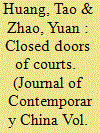| Srl | Item |
| 1 |
ID:
137501


|
|
|
|
|
| Summary/Abstract |
In China, courts may refuse to accept certain legal actions involving financial matters without any solid or explicit legal grounds. An analysis of such a phenomenon should help scholars to understand the functioning logic of China's judicial power. This article suggests that there are a number of reasons behind the filtration system, including a lack of applicable legal rules, a weak ability of the courts to understand complicated financial matters, the background of the economic system transition, the political consideration of ‘maintaining social stability’ and judiciary self-interest. Filtration has inevitably had a negative effect on China's financial markets, and reform is thus necessary.
|
|
|
|
|
|
|
|
|
|
|
|
|
|
|
|
| 2 |
ID:
132615


|
|
|
|
|
| Publication |
2014.
|
| Summary/Abstract |
The energy rebound effect has been a significant issue in China, which is undergoing economic transition, since it reflects the effectiveness of energy-saving policy relying on improved energy efficiency. Based on the IPAT equation and Brookes× explanation of the rebound effect, this paper develops an alternative estimation model of the rebound effect. By using the estimation model and latent variable approach, which is achieved through a time-varying coefficient state space model, we estimate China×s economy-wide energy rebound effect over 1954-2010. The results show that the rebound effect evidently exists in China as a result of the annual average of 39.73% over 1954-2010. Before and after the implementation of China×s reform and opening-up policy in 1978, the rebound effects are 47.24% and 37.32%, with a strong fluctuation and a circuitously downward trend, respectively, indicating that a stable political environment and the development of market economy system facilitate the effectiveness of energy-saving policy. Although the energy-saving effect of improving energy efficiency has been partly realised, there remains a large energy-saving potential in China.
|
|
|
|
|
|
|
|
|
|
|
|
|
|
|
|